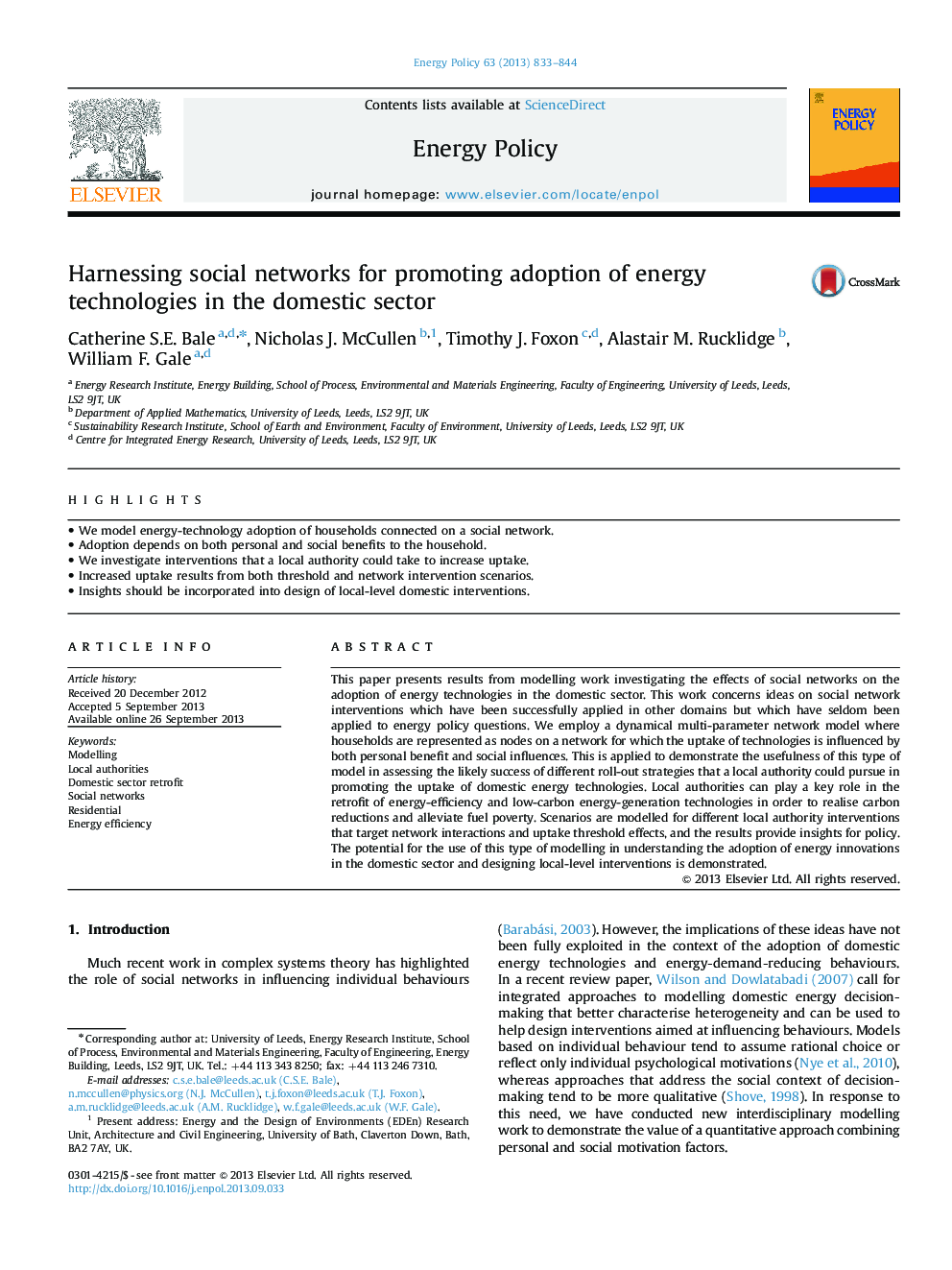| کد مقاله | کد نشریه | سال انتشار | مقاله انگلیسی | نسخه تمام متن |
|---|---|---|---|---|
| 7403920 | 1481295 | 2013 | 12 صفحه PDF | دانلود رایگان |
عنوان انگلیسی مقاله ISI
Harnessing social networks for promoting adoption of energy technologies in the domestic sector
ترجمه فارسی عنوان
استفاده از شبکه های اجتماعی برای ترویج پذیرش فن آوری های انرژی در بخش داخلی
دانلود مقاله + سفارش ترجمه
دانلود مقاله ISI انگلیسی
رایگان برای ایرانیان
کلمات کلیدی
مدل سازی، مسئولان محلی، تکمیل بخش داخلی شبکه های اجتماعی، مسکونی بهره وری انرژی،
ترجمه چکیده
در این مقاله نتایج حاصل از کار مدل سازی بررسی تاثیر شبکه های اجتماعی بر پذیرش فن آوری های انرژی در بخش داخلی ارائه شده است. این کار مربوط به ایده ها در مداخلات شبکه های اجتماعی است که در زمینه های دیگر موفقیت آمیز بوده اند اما به ندرت به سوالات سیاست های انرژی اعمال می شوند. ما یک مدل شبکه چند پارامتر پویا را به کار می بریم که خانوارها به عنوان گره ها در شبکه نشان داده می شوند که جذب فن آوری ها از طریق مزایای شخصی و تأثیرات اجتماعی تحت تاثیر قرار می گیرد. این برای نشان دادن سودمندی این نوع مدل در ارزیابی موفقیت های احتمالی راهبردهای مختلف رونویسی است که یک مقام محلی می تواند در ارتقای تطبیق فن آوری های داخلی انرژی پیگیری کند. مقامات محلی می توانند نقش مهمی در پیشگیری از بهره وری انرژی و تکنولوژی های تولید انرژی کم کربن داشته باشند تا به کاهش میزان کربن و کاهش فقر سوخت کمک کنند. سناریوها برای مداخلات مجرمانهای مختلف محلی طراحی شده اند که تعاملات شبکه را هدف قرار می دهند و اثرات آستانه را به دست می آورند، و نتایج بینش برای سیاست را فراهم می کنند. پتانسیل استفاده از این نوع مدل سازی در درک پذیرش نوآوری های انرژی در بخش داخلی و طراحی مداخلات در سطح محلی نشان داده شده است.
موضوعات مرتبط
مهندسی و علوم پایه
مهندسی انرژی
مهندسی انرژی و فناوری های برق
چکیده انگلیسی
This paper presents results from modelling work investigating the effects of social networks on the adoption of energy technologies in the domestic sector. This work concerns ideas on social network interventions which have been successfully applied in other domains but which have seldom been applied to energy policy questions. We employ a dynamical multi-parameter network model where households are represented as nodes on a network for which the uptake of technologies is influenced by both personal benefit and social influences. This is applied to demonstrate the usefulness of this type of model in assessing the likely success of different roll-out strategies that a local authority could pursue in promoting the uptake of domestic energy technologies. Local authorities can play a key role in the retrofit of energy-efficiency and low-carbon energy-generation technologies in order to realise carbon reductions and alleviate fuel poverty. Scenarios are modelled for different local authority interventions that target network interactions and uptake threshold effects, and the results provide insights for policy. The potential for the use of this type of modelling in understanding the adoption of energy innovations in the domestic sector and designing local-level interventions is demonstrated.
ناشر
Database: Elsevier - ScienceDirect (ساینس دایرکت)
Journal: Energy Policy - Volume 63, December 2013, Pages 833-844
Journal: Energy Policy - Volume 63, December 2013, Pages 833-844
نویسندگان
Catherine S.E. Bale, Nicholas J. McCullen, Timothy J. Foxon, Alastair M. Rucklidge, William F. Gale,
